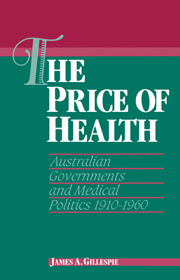Book contents
- Frontmatter
- Contents
- List of Tables
- Preface
- Acknowledgements
- Abbreviations
- Part I Medicine and the State: 1900 to 1939
- Part II The Reconstruction of Medicine? Planning and Politics, 1940 to 1949
- Chapter 5 The BMA Wins the War
- Chapter 6 From 'Sales and Service' to 'Cash and Carry': the Planning of Postwar Reconstruction
- Chapter 7 Paying the Doctor: the BMA Caught Between Salaried Medicine and Fee-for-Service
- Chapter 8 Relieving the Patient, Not the Doctor: the Hospital Benefits Act
- Chapter 9 A War of Attrition: the Fate of the Pharmaceutical Benefits Scheme
- Chapter 10 The Limits of Reform: the Chifley Government and a National Health Service, 1945–1949
- Part III The Public and the Private
- Notes
- Bibliography
- Index
Chapter 10 - The Limits of Reform: the Chifley Government and a National Health Service, 1945–1949
Published online by Cambridge University Press: 22 September 2009
- Frontmatter
- Contents
- List of Tables
- Preface
- Acknowledgements
- Abbreviations
- Part I Medicine and the State: 1900 to 1939
- Part II The Reconstruction of Medicine? Planning and Politics, 1940 to 1949
- Chapter 5 The BMA Wins the War
- Chapter 6 From 'Sales and Service' to 'Cash and Carry': the Planning of Postwar Reconstruction
- Chapter 7 Paying the Doctor: the BMA Caught Between Salaried Medicine and Fee-for-Service
- Chapter 8 Relieving the Patient, Not the Doctor: the Hospital Benefits Act
- Chapter 9 A War of Attrition: the Fate of the Pharmaceutical Benefits Scheme
- Chapter 10 The Limits of Reform: the Chifley Government and a National Health Service, 1945–1949
- Part III The Public and the Private
- Notes
- Bibliography
- Index
Summary
Man has an individual and a collective fear: his fear of sickness and helplessness is for himself and those whom he loves. This applies to all, but presses especially heavily on the man with a small income. He is afraid that sickness will come upon him or his family and that he will not be able to earn if he is ill, or cannot meet the hospital and medical expenses for his wife or children: the fear of want and fear itself are one. This fear lives with him as a daily companion until the moment comes when he, like Job, must cry, 'The thing which I greatly feared is come upon me'.
It is to some degree possible, by thrift, to lay by a small reserve against temporary periods of economic stress, but provision for the crippling debts of illness has not hitherto been possible.
The [Commonwealth Government's] scheme … is designed to remove this fear.
Senator James M. Fraser, Minister for Health and Social Services, 1944Ignoring the biological fact that to function in response to necessity, and to make some struggle for existence, is the basis of a healthy mental and physical existence, the Federal Government of the day has in mind a policy of social security so all-embracing that much of the value of the struggle for life will be lost, and the joy of saving against an uncertain future will be killed.
Sir Hugh Devine, Royal Australasian College of Surgeons, 1945.- Type
- Chapter
- Information
- The Price of HealthAustralian Governments and Medical Politics 1910–1960, pp. 233 - 250Publisher: Cambridge University PressPrint publication year: 1991



